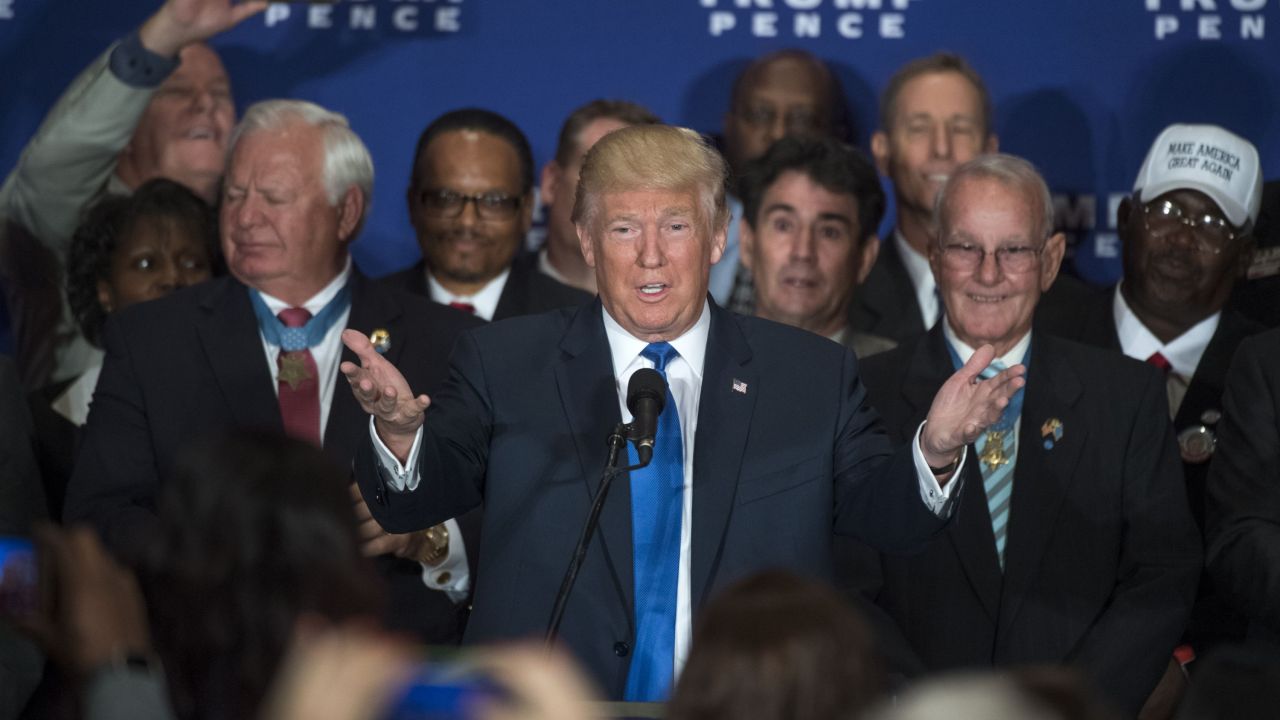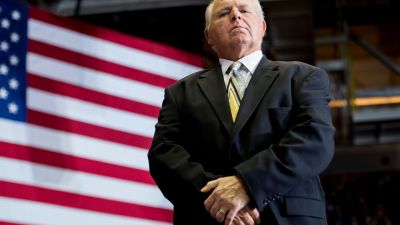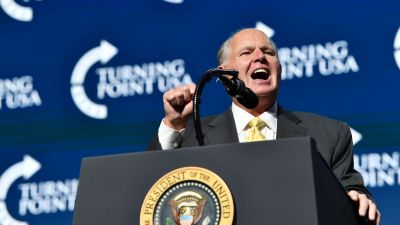
Republican presidential nominee Donald Trump with veterans at the Trump International Hotel event in Washington, DC on Sept. 16, 2016, which had been pitched to the press as a retraction of his years-long "birther" campaign against President Barack Obama. (Photo By Tom Williams/CQ Roll Call)
If you sniff around media blogs, which is part of my job, you know that something momentous may have happened last Saturday: The mainstream media finally came out of hiding and called Donald Trump what he is — a liar. And not just any old mainstream media, but the gray lady herself: The New York Times.
The headline of national political reporter Jonathan Martin’s front-page “news analysis,” as it was labeled, was “Trump Drops False ‘Birther’ Theory, But Floats a New One: Clinton Started It,” although in another edition it was headed more pointedly, “Trump Gives Up a Lie But Refuses to Repent.” A lie! What is noteworthy is not that, for perhaps the first time, the paper actually called a candidate’s statement “false,” with no equivocation, or that it labeled it a “five-year long smear” and then went on to say that Trump “falsely” accused Hillary Clinton of having started that smear. What is really noteworthy is that the paper used the word “lie.”
Indeed, even in Martin’s coverage before the Trump announcement, which called Trump out on his serial falsehoods, he wrote that Trump was expected to admit his birther campaign was a “lie.”
Times columnist Paul Krugman took notice in his blog on Saturday, remarking that after giving Trump pretty much a free pass, “the print media appear to have finally found their voice (which may shape cable coverage over time). The Times and the AP, in particular, have put out hard-hitting stories that present the essence in the lede, not in paragraph 25.”
Krugman cited tweets from congressional scholar Norm Ornstein, a mild-mannered fellow who nevertheless retweeted a post calling Trump a “liar,” and The Washington Post’s Greg Sargent, who wrote, “The idea that Clinton first raised the birther issue is a lie.” Again, no equivocation.
Sargent’s conservative colleague at The Post, Jennifer Rubin, who has been one of the most effective anti-Trumpers, wrote a bracing column headlined, “Telling Viewers the Truth — What a Concept!” Of the lie and the media pushback, Rubin said, “Hopefully they marked a turning point in coverage of the race. There was some sign of that on the Sunday shows when one after another the Sunday hosts refused to allow Trump surrogates to get away with lying. They knew objectively what has occurred in the birtherism travesty, and they were not shy about telling their viewers what is true and what is not.”
Is this really a turning point? Peter Beinart at his Atlantic blog thinks it is, going so far as to say that it may be a eulogy for the entire “he said/she said” journalistic convention in which lies and truths are treated equally and the press dare not take sides. Now, he says, they have.
In the early days of the Trump campaign, many of us conjectured that he would eventually reach critical mass, or that there would finally be a line he would cross, and the effort would end. That had always happened to lunatic candidates in the past. After the circus, voters get down to business. We were wrong. Instead, the mass kept growing, the line kept moving and the entire political system kept changing.
As it happened, the press kept adapting. If a substantial segment of the public was responsive to Trump, the mainstream media weren’t going to take him on, and although many in the MSM clearly didn’t like the guy, and although, according to a study of media coverage during the primaries from the Shorenstein Center at Harvard, his coverage was largely negative, it turns out negativity may be in the eye of the beholder. I think the media discovered that bashing Trump only fueled his popularity. The media might think excluding all Muslims from entering the country or deporting all undocumented immigrants were not particularly noble causes. Supporters clearly thought otherwise. And, in any case, they thought the press liberal and elitist.
But now, with his birther announcement, some folks think he may have actually crossed that line. As Beinart put it, “He has so brazenly lied, so nakedly appealed to bigotry and so frontally challenged the rule of law that he has made the elite media’s decorum absurd. He’s turned highbrow journalists into referees in a World Wrestling Entertainment match. Last Saturday, The Times answered Trump’s challenge.” In fact, Paul Krugman’s blog post was headlined, “A Lie Too Far?”
I am not sure whether this really is a turning point or not. We will know a lot more when we see how Trump’s lies are treated during the debates. Nor do I think the media’s turn had much to do with what he said in “retracting” his noxious birther charge. I believe it had much more to do with how he did it. He lured the media to his new Washington hotel by creating what he himself called “suspense.” Until now the media had gamely allowed themselves to be played. It was actually one of the things they seemed to admire about Trump, even as so many of them were trashing him. He knew the game. He knew how to manipulate them. He had the craft down. He was good at it.
And then he overplayed his hand. The eruptions on CNN were a perfect example of how Trump seemed to have blown it. Commentator after commentator protested that after the big buildup, Trump gave the media a hotel commercial and a scant 30 seconds of walkback with no apology. The Huffington Post noted that CNN anchors had said on the air, “We got played.”
So for the media, Trump’s sin wasn’t lying. It was his lack of craft in recanting the lie. After all, the folks at CNN are in the TV business. And so is Trump. He should have known better. He should have been smoother. But it remains to be seen if that constitutes a critical mass or not. Stay tuned.




